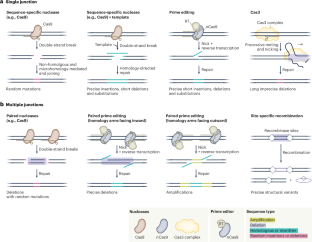用工程结构变异来研究基因组功能
IF 31.7
1区 生物学
Q1 GENETICS & HEREDITY
引用次数: 0
摘要
结构变异,如缺失、重复、倒位和复杂的重排,可对基因表达、基因组稳定性、表型多样性和疾病易感性产生深远影响。结构变异可包含多达数百万个碱基,并有可能重新排列基因组的大部分片段。与点突变相比,结构变异对人类群体遗传多样性的贡献更大,对表型特征的影响也更大。直到最近,我们对结构变异影响的了解还主要停留在对自然发生变异的研究上。新的基因组工程工具能够产生缺失、插入、倒位和易位,加上新重组酶的发现和合成 DNA 构建的进步,现在能够设计和产生更大范围的结构变异。在此,我们将讨论这些工具及其应用实例,并强调要充分利用这些工具的潜力需要克服的现有挑战。本文章由计算机程序翻译,如有差异,请以英文原文为准。


Engineering structural variants to interrogate genome function
Structural variation, such as deletions, duplications, inversions and complex rearrangements, can have profound effects on gene expression, genome stability, phenotypic diversity and disease susceptibility. Structural variants can encompass up to millions of bases and have the potential to rearrange substantial segments of the genome. They contribute considerably more to genetic diversity in human populations and have larger effects on phenotypic traits than point mutations. Until recently, our understanding of the effects of structural variants was driven mainly by studying naturally occurring variation. New genome-engineering tools capable of generating deletions, insertions, inversions and translocations, together with the discovery of new recombinases and advances in creating synthetic DNA constructs, now enable the design and generation of an extended range of structural variation. Here, we discuss these tools and examples of their application and highlight existing challenges that will need to be overcome to fully harness their potential. Structural variations (SVs) impact gene expression, genome stability and disease susceptibility. This Review discusses recent advances in genome-engineering tools that enable precise SV generation and highlights the challenges that remain.
求助全文
通过发布文献求助,成功后即可免费获取论文全文。
去求助
来源期刊

Nature genetics
生物-遗传学
CiteScore
43.00
自引率
2.60%
发文量
241
审稿时长
3 months
期刊介绍:
Nature Genetics publishes the very highest quality research in genetics. It encompasses genetic and functional genomic studies on human and plant traits and on other model organisms. Current emphasis is on the genetic basis for common and complex diseases and on the functional mechanism, architecture and evolution of gene networks, studied by experimental perturbation.
Integrative genetic topics comprise, but are not limited to:
-Genes in the pathology of human disease
-Molecular analysis of simple and complex genetic traits
-Cancer genetics
-Agricultural genomics
-Developmental genetics
-Regulatory variation in gene expression
-Strategies and technologies for extracting function from genomic data
-Pharmacological genomics
-Genome evolution
 求助内容:
求助内容: 应助结果提醒方式:
应助结果提醒方式:


